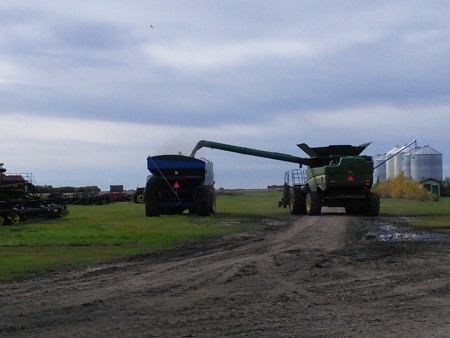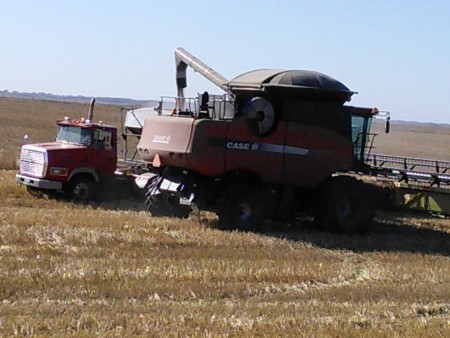“Our kids died living life on the farm. It is a family farm. We do not regret raising and involving our kids… on our farm,†he read. “It was our life.â€

This week 3 sisters died by grain engulfment in rural Alberta. This is undeniably terrible for their family, their community, and agriculture in general. This is also not a surprising nor unheard-of event, grain engulfment is a widely-acknowledged hazard in agriculture and transportation industries, and there are multiple campaigns to help workers stay safe during grain loading. Simply described, grain engulfment is drowning in grain, not being able to breathe or to free yourself from the heavy grain on top of you.  It can happen if you get stuck under an auger, behind a grain dump truck, or if grain stuck to the side of a bin comes down on top of you. This is not a peaceful floating-off kind of death, but rather several minutes of pain, choking, and struggle.

For this type of catastrophe to happen to kids is heartbreaking because it is predictable and preventable.  This has happened before many times, and just as before, the media is not doing a safety-oriented job of reporting it.  The Marshfield Clinic guidelines for reporting farm injuries and fatalities are clear, but see if you can spot where the narrative of this story deviates from the ideal:
- DO use the word ‘incident’ rather than ‘accident’
- DO describe the safety violations or prevention measures – this gives a fighting chance at a prevention message along with the catastrophe
- DO depict farming as an intense, high-risk industry
- DO emphasize the adult’s role in prevention
- DO NOT describe children as ‘loving to help’ – this gives the impression its OKÂ to let children into industrial zones and near high-risk tasks
- DO NOT describe incidents as ‘completely unpredictable’ or ‘freak events’ – everyone should be aware of the hazards and risks of farm machinery, tasks, and environments
- DO NOT suggest that unsafe practices are ok because they are a ‘tradition’
Responding on the news story to a commenter that questioned having children around the workplace, Bott wrote: “This is our life. It is not sterile like city life.â€
Many of the quotes and even the articles themselves seem to glamorize the earthy virtue of farming, without much critical thought around how this could be prevented. I understand that reporters are reluctant to criticize parents ‘when they are down’ and already grieving a terrible loss. However, I don’t think things can really get much worse for those parents no matter what is written, and I’m sure they would want other parents to avoid the type of grief they are going through. So reporters: don’t hold back!  Tell the safety story and ask experts for prevention quotes so that readers are left with a sense of purpose, not only a sense of loss.
I did find one article which addresses safety and the responsibility of adults here (in metro of all places).  I hope some folks hear the message and take action to prevent child deaths on farms.

Wow, thank you for sharing this information, and including the established guidelines for reporting it, so that the “readers are left with a sense of purpose, not just a sense of loss.” This is so very important, and as you state, with safety oriented reporting to help raise awareness, this kind of devastating loss can be prevented.
On a lighter note, I really like your cows come home article, and new banner photo.
In short, you are extremely awesome, thank you for sharing.